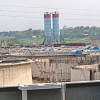15 yrs into order, tanners say can’t relocate

Nearly 15 years ago, the High Court had ordered the government to relocate around 200 tanneries from the city’s Hajaribag to save the Buriganga river and the environment.
From 2003, the government initiated a project in Savar where these hazardous factories would be relocated.
But till date, the tannery owners found one excuse after another to avoid going to Savar. Their latest excuse is that the government had not finished constructing a central Effluent Treatment Plant in the last one decade.
On Sunday Industries Minister Amir Hossain Amu instructed the authorities to shut down tanneries if their owners fail to relocate the factories from Hazaribagh to the designated industrial park in Savar within 72 hours.
The Daily Star visited Hajaribagh on the following day, only to find that the owners were unmoved by the instruction.
“Its not possible to relocate factories overnight,” said a tannery owner, priding himself of bringing home foreign currencies worth nearly Tk 10000 crore a year, “besides they have not completed constructing the ETP.”
The tannery owners also said that they will move to Savar in July—if the government completed constructing the ETP.
The call to relocate factories was not made overnight as it’s a 15 year old decision.
As for the foreign exchange earnings claim, the tannery owners never compensated the nation for destroying the 20 km long river Buriganga with its toxic sludge. The cost of killing the river is incalculable and its impact will last for generations.
For the last few decades, no fish or other aquatic animals can sustain in the Buriganga. The tanneries also ruined livelihoods of several hundreds of fishermen living along the river. Watersheds around the Hazaribagh area including canals and wetlands are also polluted.
The soil and the water of Hazaribagh area is so polluted with around toxic chemicals like chromium, lead, arsenic would remain in the atmosphere for next 100 years.
The first tannery in Hazaribagh was set up in 1947. There are now 195 such factories.
Around 60 to 70 thousand tons of raw hides and skins are processed in these tanneries every year and release 95,000 litres of untreated effluents into the open every year, made the Buriganga a dead river.
World Health Organization (WHO), the workers work in tannery suffer from gastrointestinal, dermatological, respiratory, carcogenic dieses,
Half a million people living in and around Hazaribagh are suffering from water, air, soil pollution and living in an environment where the air is always thick of odors.

 For all latest news, follow The Daily Star's Google News channel.
For all latest news, follow The Daily Star's Google News channel. 








Comments